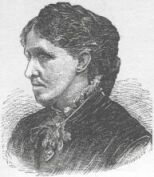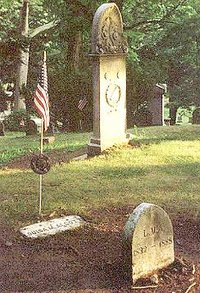Louisa May Alcott
|
|
Louisa May Alcott (November 29, 1832 – March 6, 1888) was an American novelist, best known for the novel Little Women (1868).
Childhood and Early Works
Alcott was the daughter of noted Transcendentalist Amos Bronson Alcott and Abigail May, and though of New England parentage and residence, was born in Germantown, now part of Philadelphia, Pennsylvania. She began work at an early age as an occasional teacher, seamstress, governess, and writer — her first book was Flower Fables (1854), tales originally written for Ellen Emerson, daughter of Ralph Waldo Emerson.
Alcott's early education had included lessons from the naturalist Henry David Thoreau but had chiefly been in the hands of her father. During her girlhood and early womanhood, she shared in her family's poverty and Transcendentalist ideals. She later narrated this time in a newspaper sketch entitled "Transcendental Wild Oats", afterwards reprinted in the volume Silver Pitchers (1876), which relates the experiences of her family during an experiment towards Utopian "plain living and high thinking" at "Fruitlands" in the town of Harvard, Massachusetts in 1843.
In 1860, Alcott began writing for the Atlantic Monthly, and she was nurse in the Union Hospital at Georgetown, D.C., for six weeks in 1862-1863. Her letters home, revised and published in the Commonwealth and collected as Hospital Sketches (1863, republished with additions in 1869), garnered her first critical recognition for her observations and humor. Her novel Moods (1864), was also considered promising.
A lesser-known part of her work are the passionate, fiery novels and stories she wrote, usually under the pseudonym A. M. Barnard. These works, such as A Long Fatal Love Chase and Pauline's Passion and Punishment, were known in the Victorian Era as "potboilers" or "blood-and-thunder tales" and were later referred to as "dangerous for little minds" in Alcott's own novel Little Women. Their protagonists are willful and relentless in their pursuit of their own aims, which often include revenge on those who have humiliated or thwarted them. These works achieved immediate commercial success and remain highly readable today.
In contrast, Alcott also produced moralistic and wholesome stories for children, and, with the exceptions of the semi-autobiographical tale Work (1873), and the anonymous novelette A Modern Mephistopheles (1877), which attracted suspicion that it was authored by Julian Hawthorne, she did not return to creating works for adults.
Literary Success and Later Life
Louisa May Alcott's overwhelming success dated from the appearance of the first part of Little Women: or Meg, Jo, Beth and Amy (1868), a semiautobiographical account of her childhood years along with her sisters in Concord, Massachusetts. Little Men (1871) treated similarly the characters and ways of her nephews who lived with her at Orchard House in Concord, Massachusetts. Jo's Boys (1886) completed the "March Family Saga." Most of her later volumes, An Old-Fashioned Girl (1870), Aunt Jo's Scrap Bag (6 vols., 1871-1879), Rose in Bloom (1876), and others, followed in the line of Little Women, remaining popular with her large and loyal public.
Despite worsening health, Alcott wrote through the rest of her life, finally succumbing to the aftereffects of mercury poisoning contracted during her Civil War service. She died in Boston on March 6, 1888, two days after visiting her father on his deathbed.
The story of her life and career was initially told in Ednah D. Cheney's Louisa May Alcott: Her Life, Letters and Journals (Boston, 1889) and then in Madeleine B. Stern's seminal biography Louisa May Alcott (University of Oklahoma Press, 1950).
External links
Template:Wikisource author Template:Wikiquote
- Template:Gutenberg author
- biographical information (http://www.empirezine.com/spotlight/alcott/alcott.htm)
Template:Livedde:Louisa May Alcott gl:Louisa May Alcott it:Louisa May Alcott he:לואיזה מיי אלקוט nl:Louisa May Alcott pl:Louisa May Alcott


